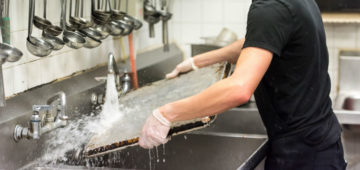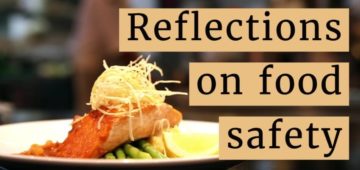- 26 March 2024
Dr Lisa Ackerley, Food Safety Adviser to the RSPH appeared on BBC News at 9pm last night to discuss the E.coli outbreak.
Since the outbreak over 1,500 people have been infected with E.coli linked to the outbreak in Germany and 18 have died, including 17 in Germany and 1 in the Sweden. The source of the outbreak is currently unknown, although salad items have been suggested. Until the source is known, then there are some general precautions that can be taken as E.coli outbreaks have been associated with a number of foods and environmental situations including: salads, unpasteurised milk and apple juice, vegetables, burgers, water supply, farms and beaches.
Lisa discussed the public health issues involved in the outbreak providing some essential information for the public.
Those returning from Germany in particular should watch out for potential symptoms of the infection including nausea, vomiting, stomach cramping and bloody diarrhoea. Medical advice should be sought immediately in the case of bloody diarrhoea. Those infected with E.coli may be unaware of this for up to 8 days therefore remain alert during the days following your return. People returning from Germany with diarrhoea should also not prepare food for other people in their household and should not work if it involved handling food. Thorough hand washing is extremely important after using the toilet. For more information on avoiding E.coli in the catering business please read the FSA’s new guidance http://www.food.gov.uk/news/newsarchive/2011/june/ecoliqanda.
With regard to food preparation, fruit and vegetables should be washed thoroughly before eating and where possible peeled. To be totally safe foods should be cooked. Anyone travelling to Germany should be particularly vigilant and take care to only eat well-cooked foods and drink pasteurised milk and juice as well as bottled water. Travellers should avoid tap water, ice and salads (including garnish) until the source of the outbreak is clear.
Good hand washing should also be enforced. E.coli can be infectious in very low numbers so the importance of hand washing and disinfecting surfaces, particularly the bathroom or kitchen, which may have come into contact with the infected person or with raw vegetable or meat preparation is essential to prevent further spread of the infection. Anyone caring for someone with E.coli should also ensure they wash their hands very frequently and use a separate towel to the person they are caring for. Laundry of an infected person must be carried out at high temperatures – above 90oC.
People should also listen out for advice from the Food Standards Agency www.food.gov.uk and the Health Protection Agency www.hpa.org.uk.
The RSPH spoke to Lisa about the impact on the industry with “false alarms”. She commented that it was a catch 22 situation, whereby if the alerts were not raised and turned out to be real threats there would be a huge impact however if they are raised and turn out to be false alarms, as in the case of the Spanish cucumbers, there is the risk of ruining businesses.
Lisa also stressed that the same procedures apply to members of the public to try to control and prevent the spread of the new strain. Good hygiene throughout the food chain, including cooking minced meat products to above 75oC, washing fruit and vegetables before eating and sourcing them from farms where access from wildlife is controlled.
If you would like more information regarding E. coli and the outbreak please visit the Food Standards Agency or Health Protection Agency’s websites.
The RSPH’s 2011 conference programme includes several conferences which will provide essential information on E. coli. ‘Food Safety Outbreaks’ in July is designed for all members of the Outbreak Control Team and EHOs providing an update on how to identify, control and prevent outbreaks while E. coli in November, chaired by Dr Lisa Ackerley will provide a full insight into the infection looking at case studies, controls and prevention. To find out more please visit http://www.rsph.org.uk/en/courses-conferences-and-events/events/index.cfm.
Notes to editors
The Royal Society for Public Health (RSPH) is an independent, multi-disciplinary organisation, dedicated to the promotion and protection of collective human health and well-being. Through advocacy, mediation, empowerment, knowledge and practice we advise on policy development, provide education and training services, encourage scientific research, disseminate information and certify products, training centres and processes.
Around 100,000 students take our qualifications each year in food hygiene, salon hygiene, pest control, health & safety, nutrition, the built environment, health, meat inspection and emergency planning. We provide qualifications which are directly relevant to the workplace and we help people to progress through their chosen career by offering qualifications at different levels. RSPH is also an awarding body recognised by Ofqual. We have a network of over 1500 training centres throughout the UK. We provide a wide range of course material including syllabuses and sample exam papers.
The RSPH is an independent charity formed in October 2008 with the merger of the Royal Society of Health (RSH) and the Royal Institute of Public Health (RIPH). The RSPH has a Royal Charter and Her Majesty The Queen is the Society’s Patron.



